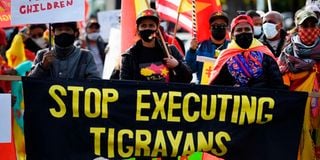Three refugees killed by air strike in Ethiopia's Tigray: UN

Demonstrators march in Washington, DC on November 4, 2021, marking the one-year anniversary of the Ethiopian government's decision to deploy troops into the country's northernmost Tigray region.
Three Eritrean refugees, including two children, were killed by an air strike that hit a refugee camp in Ethiopia's Tigray region, where the government has been waging a year-long war against rebels, the United Nations said Thursday.
"I am deeply saddened to learn that three Eritrean refugees, two of them children, were killed yesterday, in an airstrike that hit the Mai Aini refugee camp in northern Ethiopia," UN High Commissioner for Refugees Filippo Grandi said in a statement.
Four other refugees were injured but their lives are not at risk, the statement said, adding that the UN refugee agency UNHCR "is assisting them to receive medical care".
"My thoughts and deepest sympathies are with the loved ones of those lost in this attack," Grandi said, stressing that refugees "should never be a target."
"While UNHCR continues to gather and corroborate details on the events, I reiterate UNHCR's call on all parties to the conflict to respect the rights of all civilians, including refugees."
The war broke in November 2020 when Ethiopia's Prime Minister Abiy Ahmed sent troops into Tigray after accusing the region's dissident ruling party, the Tigray People's Liberation Front (TPLF), of attacks on federal army camps.
The Nobel Peace laureate declared victory but rebel fighters hit back, recapturing most of Tigray and pushing into neighbouring regions.
The rebels reportedly reached around 200 kilometres (125 miles) outside the capital Addis Ababa by road, but at the end of December they announced they would withdraw to Tigray, marking a turning point in the war.
'Killing people'
Tigray is also under a communications blackout and what the UN has described as a de facto aid blockade, preventing sufficient food and medicine from reaching the northern region of six million people.
No trucks with aid cargo have reached Tigray since December 14 and others waiting to enter the region had been plundered, according to the UN humanitarian agency OCHA said in its latest report.
UN spokesperson Stephane Dujarric said Thursday that since July 12, only 1 338 trucks have been able to enter Tigray, "which is less than 12 per cent of the trucks we need to get in".
"As we've been telling you many times, we need about 100 trucks every day to meet the humanitarian need of people in Tigray," he told a daily media briefing.
Health outreach has been halted in parts of Tigray because of a shortage of essential drugs, according to OCHA.
World Health Organisation chief Tedros Adhanom Ghebreyesus, himself a Tigrayan, said Thursday that WHO "has not been permitted to deliver medical supplies" to Tigray since mid-July 2020.
"This is despite repeated requests from WHO to provide medical supplies to the Tigray region," he told a Covid-19 press conference.
"Even in the toughest periods of conflict in Syria, South Sudan, Yemen and others, WHO and partners have had access to save lives.
"However, in Tigray the de facto blockade is preventing access to humanitarian supplies, which is killing people."





